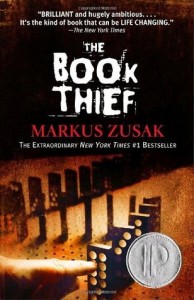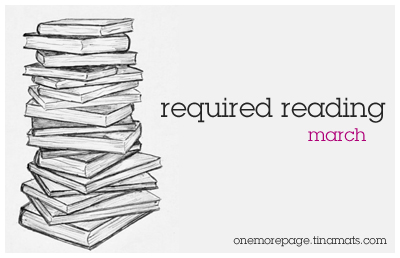 The Book Thief by Markus Zusak
The Book Thief by Markus Zusak
Publisher: Alfred A. Knopf
Number of pages: 550
My copy: paperback, bought from National Bookstore
It is 1939. Nazi Germany. The country is holding its breath. Death has never been busier, and will become busier still.
By her brother’s graveside, Liesel Meminger’s life is changed when she picks up a single object, partially hidden in the snow. It is The Grave Digger’s Handbook, left there by accident, and it is her first act of book thievery. So begins a love affair with books and words, as Liesel, with the help of her accordion-playing foster father, learns to read. Soon she is stealing books from Nazi book-burnings, the mayor’s wife’s library, wherever there are books to be found.
But these are dangerous times. When Liesel’s foster family hides a Jew in their basement, Liesel’s world is both opened up and closed down.
* * *
I tried reading Markus Zusak’s The Book Thief in 2011, a little over a year after I got the book. Then I stopped, because I wasn’t in the mood to read the book yet, so I shoved it back into my TBR with no concrete plans of reading it. I knew it was good, but I didn’t know when I’d have the time to read it. Two years later, the book was selected for our book club’s discussion this month, and I figure that’s why I didn’t read it back then.
The Book Thief is a World War II story, set in Nazi Germany, about a little girl who steals books because of her love of books and words. But it’s not really that simple, because of the war, and all the other things going on around her and in her life with her foster parents. The story is also a little bit more complicated because it wasn’t narrated by the girl or any other people surrounding her. Instead, the entire story was narrated by Death, who was very busy collecting souls at the time of war and yet Liesel Meminger the book thief caught his eye.
I don’t like WWII stories. I’ve read several books but they weren’t books that totally focused on war or the casualties of it. I never really read much about bombings or the people dying, and I never liked reading about them because it saddens me, and quite frankly, it gives me the creeps. I didn’t know what to expect with The Book Thief, except maybe that people I know who read and loved them cried at the end…so maybe, I will cry too?
Here’s the thing: I thought that having Death narrate this story is quite ingenious. Sure, Death is quite snarky and he loves giving spoilers, but it gives the story a little bit of a different perspective, than say if Liesel was the narrator. I actually liked Death’s segues and the random facts, although it took me some time to get used to. There also wasn’t as much war in the book as I thought it would have, and it was good…but there were enough to make me stop reading for a while and breathe because I felt horrified at what I was reading. War is never a pretty thing, after all.
The little neighborhood in Molching, and the people in Himmel Street grew on me, some quick like Hans Hubermann and some took a while, like Ilsa Hermann. I was constantly holding my breath, hoping against hope that nothing bad would happen to them…but like I mentioned, Death loved giving so many spoilers, so even if I managed to spoil myself accidentally while we were having the online discussion for this book, I realized that getting spoiled early on didn’t really matter because the narrator would do that for you. But in a way, this builds the right expectations, and somehow, a part of me still didn’t want to believe what Death said would happen. Oh how I wished it wasn’t so. I’m also particularly fond of Rudy Steiner, too, and …that boy really just broke my heart.
The Book Thief made me reflect on several things, especially with how words and reading played such a big deal in the characters’ lives. That was my favorite part, how there was so much emphasis on reading and the power of words. I liked how it was illustrated in the book and how it showed that even if words were used for evil, you can use it for good, too, and using it for the latter touches so many people, even Death himself. I’m all about words, you see, and I could really relate with Liesel when she found her words and how she “…would wring it out like the rain.” (p.80) It made me wonder if I can still remember how it is not to have words at my disposal, and not to have the books where I have access to so many words. Furthermore, it made me wonder: do I use my words like the Führer? Or do I use them like Liesel?
I have hated the words and I have loved them, and I hope I have made them right.
I didn’t bawl at the end of The Book Thief, but I did shed some tears, and it took me a while before I could move on from the story. I suppose, like Death, I was haunted. And I think that I will remain haunted by it for a little while longer, because there’s really so much in this book than what was written on the synopsis, or from its black and brown (at least in my edition) cover. It’s not just a WWII story, but more, and I’d rather that Death the narrator would spoil it for you rather than me.
I wanted to tell the book thief many things, about beauty and brutality. But what could I tell her about those things that she didn’t already know? I wanted to explain that I am constantly overestimating and underestimating the human race – that rarely do I ever simply estimate it. I wanted to ask her how the same thing could be so ugly and so glorious, and its words and stories so damning and brilliant.
One last thing: I hope that when Death comes for me, he’ll find my soul sitting up.
Rating: [rating=4]
Other reviews:
The Nocturnal Library


[…] I never liked reading about them because it saddens me, and quite frankly, it gives me the creeps.
– Does this mean that, as a reader, you are an escapist?
I guess so? But I don’t really escape to fantasy (because I checked the definition of being an escapist and it all points to fantasy). If there’s an escapist for contemporary fiction, then maybe that’s me?
That, and I’m not a huge fan of historical fiction. And war.
I could barely remember the details but I definitely did not cry in the end. LOL.
I’m not surprised, since you were pretty lukewarm with this, right? :D It happens.
It makes me wonder if I have a bias for Australian authors, though, because almost all the Aussie-written books I’ve read were really good. Maybe I should pick up I Am the Messenger to see if I would still like him.
“One last thing: I hope that when Death comes for me, he’ll find my soul sitting up.”
I love this. :)
And I shed some tears when I read it some 2 years ago. I want to shed some tears now remembering that my hardback copy has not yet been returned. :(
I found that part particularly poignant, about how Death found some souls sitting up when he came for them.
I finished the book while I was grieving for my dead dog (Huhu Batman!), so the tears were also an after-effect of that. I found the entire book both sad and charming and deep…and well, sad.
Ack, I hope your copy gets returned to you soon!
Pingback: TFG’s Book of the Month for March: The Book Thief by Markus Zusak | Book Rhapsody